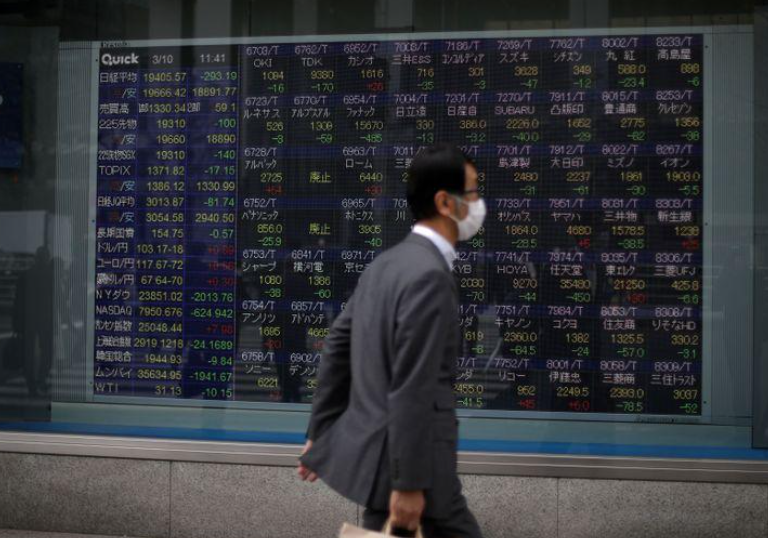
Shares surged, oil prices jumped and the U.S. dollar remained weak on Monday as expectations of fewer regulatory reforms and more monetary stimulus under U.S. President-elect Joe Biden supported risk appetite.
The Democratic candidate’s election victory was already largely priced in by markets, which had been trading with the view of a Biden presidency and a Republican-controlled U.S. Senate since last week.
E-mini futures for the S&P 500 jumped more than 1.5% on Monday while Nasdaq futures rallied over 2%, signalling a positive start for U.S. markets.
Eurostoxx 50 futures gained 1.7%, Germany’s DAX futures climbed 1.8% and FTSE futures rose 1.4%.
The mood was also upbeat in Asia, with all major indexes in the green.
MSCI’s broadest index of Asia Pacific shares outside of Japan .MIAPJ0000PUS jumped 1.4% to 614.73 points, the highest since January 2018. It climbed 6.2% last week to clock its best weekly performance since early June.
“While lots of attention was given to Trump vs Biden, markets have reacted strongly to the (likely) split congress, which means more confidence that interest rates will be lower for longer,” said Dave Wang, portfolio manager at Nuvest Capital in Singapore.
“The best opportunities now lie within segments of emerging markets, in particular China and North Asia. I believe earnings momentum and valuation put China in a very attractive risk/reward position.”
Chinese shares started higher with the blue-chip CSI300 index .CSI300 up 2.2% on hopes of better Sino-U.S. trade relations under Biden.
Japan .N225 rose 2.4% while the main indexes of Australia .AXJO, Hong Kong .HSI and South Korea .KS11 gained 1.5% each.
Equities rallied hard last week, with the S&P500 .SPX up 7.3%, clocking the best gain in an election week since 1932, according to National Australia Bank analyst Tapas Strickland.
Matt Sherwood of Australian fund manager Perpetual, however, said Biden’s victory did not necessarily warrant a tweaking of his portfolio.
“In the end, we think the U.S. economy is still fairly fragile and growth’s slowing down,” Sherwood said.
“You could potentially gravitate your portfolio more towards higher-beta type markets, such as emerging markets, and there is potential for better prospects in the energy space than would have been the case with a Democrat clean sweep.”
Oil prices jumped on Monday as investors cheered Biden’s victory, shrugging off worries about lacklustre demand amid rising global coronavirus cases.
Brent crude added $1 to $40.48.
Analysts said the outlook might get tougher from here as investors focus on Biden’s ability to expand fiscal stimulus and measures to reduce the spread of COVID-19.
The United States saw a record number of new coronavirus infections last week, with the total number of cases nearing 10 million.
U.S.-based wealth manager Jim Wilding at Confluence Financial Partners in Pennsylvania added a word of caution considering the S&P 500 .SPX is not far from all-time highs and equity valuations are generally at heady levels.
“While we remain positive over the intermediate term outlook and believe divided government reduces the chances of a bear case scenario playing out, we would refrain from unbridled enthusiasm at current levels,” he noted.
A fiscal stimulus plan is still possible despite a divided government, analysts said, though a larger package is less likely. That puts the spotlight on the U.S. Federal Reserve to do more to bolster the world’s largest economy.
As a result, the dollar has weakened in recent days while growth proxies such as the Australian dollar have rallied with the Biden presidency seen less likely to be confrontational on trade.
The U.S. dollar was mostly flat against the yen at 103.36, after slipping about 1.3% last week.
The Aussie scaled a 1-1/2 month high of $0.7297, having jumped 3.3% last week as trade-exposed currencies got a fillip from Biden’s predicted victory.
Investor focus will also be on sterling and the euro this week with Brexit trade negotiations coming to a head with the EU summit on Nov. 15.
Later in the day, the Bank of England’s chief economist will give a speech on ‘The economic impact of coronavirus and long term implications for the UK’.
The euro, which climbed 1.9% last week, was a shade higher on Monday at $1.1891. Sterling rose 0.2% to $1.3183.